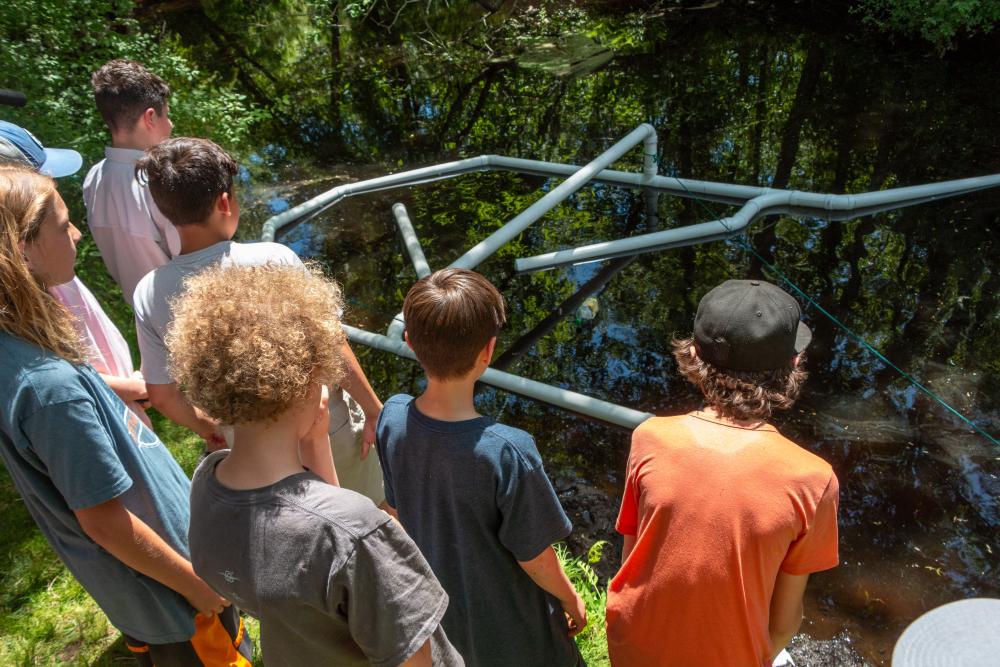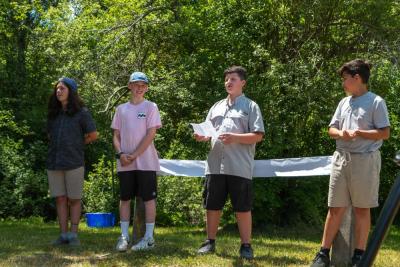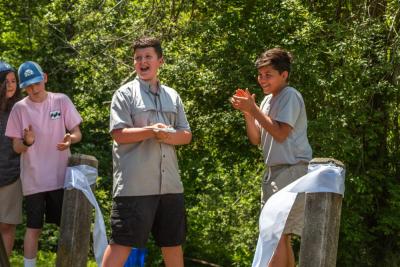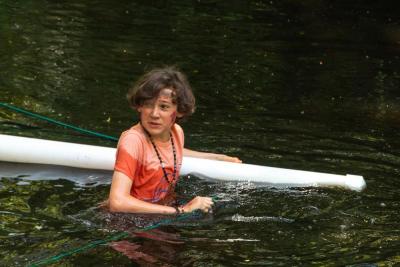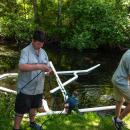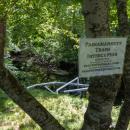Dartmouth sixth-graders invent river cleanup device
One man’s trash is another boy’s inspiration.
Friends Academy sixth-grader Paul Athanasiou was on a nature hike last year when he spotted a plastic grocery bag floating in the river, just feet from where a turtle was swimming.
The image struck him and eventually inspired his project to clean up the river that was finally launched last week after months of hard work.
“A lightbulb came into my head,” he said.
Athanasiou’s idea was to build a device that would collect trash that floated down the Paskamansett River, which flows through the grounds of the school as well as several Dartmouth Natural Resources Trust reserves before dumping into the Lloyd Center and, eventually, Buzzards Bay.
After taking to YouTube to research how such a device could be made, he found a video about a multi-million dollar, industrial-scale trash collector built by environmental organization The Ocean Cleanup.
While the machine they found was built with conveyor belts, solar panels, and a huge trash capacity, Athanasiou saw something in it that could be recreated on a much smaller scale.
Together with a few classmates, Athanasiou drafted plans and built the first version of the machine.
“After many months of designing we made a prototype,” said Athanasiou, explaining that the first version was made out of wood and was smaller than the final design, which uses PVC pipe.
Jonah Felix, a fellow sixth-grader who helped Athanasiou with the project, said that durability and weight were the major factors the group considered in switching to plastic tubing.
“[The prototype] was a lot heavier and would rot away,” he said. “But with PVC, it will last a lot longer.”
The idea behind the design, the young environmentalists explained, is to use the river’s current to draw in trash that is floating on the surface of the water, and then keep it penned in until it can be collected with a pool skimmer.
“The idea is like a lobster trap, sort of,” said sixth-grader Jake Hollister, who also helped with the project. “The trash can go in but it can’t come out.”
After the group decided on a final design, the next step was to fund the project.
Athanasiou said he had already set up a fundraising committee before he approached the head of school, Benjamin Kennedy to ask if the school would make a contribution.
“I thought he would say no, but he said, ‘get me three quotes and I’ll pay for it,’” said Athanasiou.
But that wasn’t the last challenge the group had to overcome to get their project in the water.
Since the idea was to put the device in a town river, Athanasiou had to get approval from the town Conservation Commission before he could go ahead.
Though it was “nerve-racking” speaking in front of the commission, Athanasiou said the members were united in their support of his idea.
“It was unanimous,” he said. “They liked the project, they really did.”
With the final approval in place, Athanasiou and his classmates worked hard during their free periods to assemble the materials, build the machine, and get it in the water before the end of school — a deadline they made with little time to spare.
“We didn’t even think we were going to build it this fast and we only have one more day of school, so we wanted to get it in the water now,” said Athanasiou.
On June 6, the day they put the device in the water, a crowd of people — including parents, teachers, classmates, and news media — gathered by the river where Athanasiou read a speech thanking his teacher Michael Britt, Kennedy, and the maintenance staff that helped him realize his project.
“Mr. Britt, I’ve waited all year for this,” he said. “We did it!”
When the acknowledgements were complete, Athanasiou and Felix cut a ribbon and directed their classmates on how to lift the device and put it in the water.
Though a few kids got muddy, and one even swam out into the middle of the river to unhook a tangled rope, the trash collector was eventually put in place.
Dartmouth’s Environmental Affairs Coordinator, Marc Garrett, showed them how to tie it up so it wouldn’t float away, and, finally, they watched as a plastic bottle was thrown in and slowly floated down river and into the trap.
When all was said and done, the young environmentalists had a few pieces of advice for anyone embarking on a project like theirs.
Felix emphasized the importance of perseverance and determination.
“Don’t give up,” he said. “If you build something like this there’s gonna be so many problems but you have to work through them.”
Athanasiou’s advice, though, reflected his appreciation for all the help he received along the way, taking his project from idea to reality.
“In the end it’s really great to have all your friends help you,” he said.



